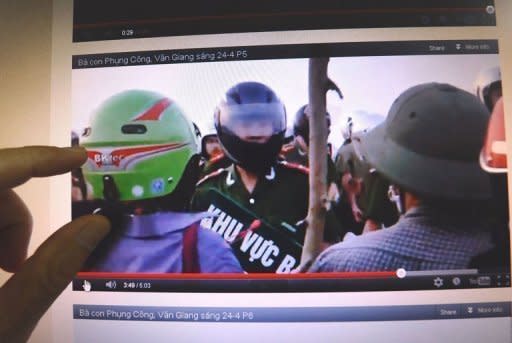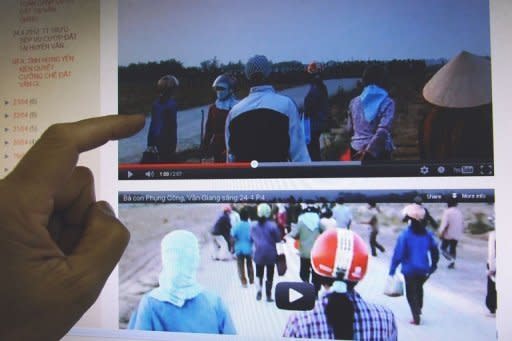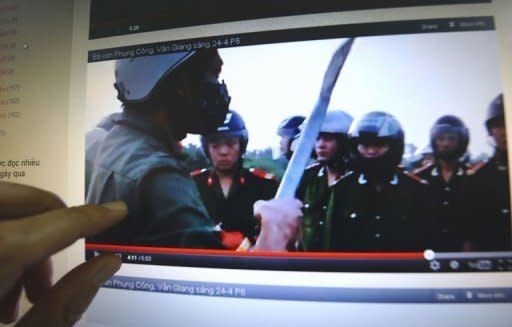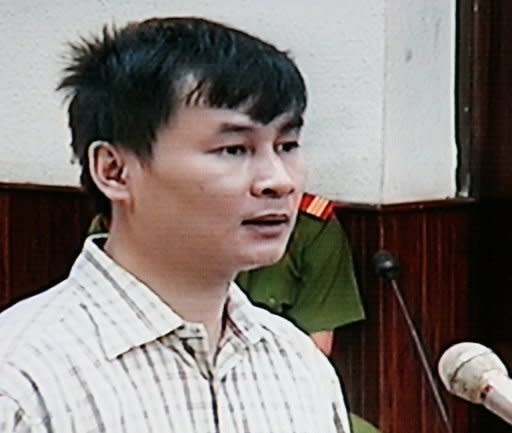Vietnam bloggers battle tightening censorship
When riot police broke up a recent protest over a forced eviction, Vietnam's bloggers were ready -- hidden in nearby trees, they documented the entire incident and quickly posted videos and photos online. Their shaky images spread like wildfire on Facebook, in a sign of growing online defiance in Vietnam, in the face of efforts by authorities to rein in the country's Internet community. "They follow me, they keep track of what I am writing, they keep track of all dissident bloggers. Anything they can do to harass us, they do," said blogger Nguyen Thi Dung, one of several bloggers who publicised the April 24 Hung Yen unrest on a variety of websites. "They have many people browsing the net, reporting things they don't like, getting them taken down. It is a perfect copy of what the Chinese are doing on the Internet," she told AFP, asking that her name be changed for her safety. Authoritarian Vietnam, classed an "enemy of the Internet" by Reporters Without Borders, is drafting a new decree on online content in a bid to clamp down on the country's increasingly bold blogosphere. The 60-article draft decree -- a translated copy of which was obtained by AFP -- bans "abusing the Internet" to oppose the government. It would force bloggers to post real names and contact details, make news websites obtain government approval to publish, and compel site administrators to report any banned online activity to authorities. The decree also seeks to make foreign companies that provide online services in Vietnam -- like Facebook and Google -- cooperate with the government and could force them to locate data centres and offices in the country. But while some activists and experts see a chilling threat from the draft law, others say the government is fighting a losing battle to police Vietnam's 30 million plus online community. "Any kind of imposing of new limits will just lead to new ways of overcoming all difficulties to get through the firewall," one blogger said on condition of anonymity. "People will always find new, creative ways to access banned sites -- like they already do with Facebook (which is sporadically blocked in Vietnam) now," he said. David Brown, a retired US diplomat who served in several posts throughout Southeast Asia, said the draft decree was "unenforceable". At the worst, the decree might give authorities more explicit infractions to charge bloggers with, he said. But Brown said he doubted that "it will inconvenience Facebook or Google (or) change the de facto relationship of bloggers to the government", he said. Internet commentators are increasingly covering sensitive issues such as corruption, territorial disputes with China and rising discontent over land rights, often linking up with disaffected communities. In the past, journalists set up blogs to spread information not published in the mainstream press, but "the recent phenomenon of bloggers going to the sites of land protests to cover it virtually live is new", said Vietnam expert Carl Thayer. Hanoi-based Nguyen Xuan Dien's live-blogging of the Hung Yen eviction -- with photos and video of thousands of riot police evicting farmers and beating two journalists covering the protest -- quickly went viral, giving the unrest wide coverage despite being virtually ignored in the state media. Thayer said Vietnam's new decree is "an attempt to keep up with the times". "(It will) tighten the screw on internal dissidents and severely restrict their activities by making them, as well as commercial service providers, responsible for material broadcast or stored on the Internet," he said. While censorship is not new in communist Vietnam, New York-based Human Rights Watch has said the country "intensified its repression" of dissidents last year. Three high-profile bloggers, including one whose case has been raised by US President Barack Obama, are currently awaiting trial in Ho Chi Minh City for "propaganda against the state". If implemented, the new rules could "lead to more arbitrary harassment and arrests for online postings and an overall chilling effect that results in greater self-censorship", HRW's Phil Robertson told AFP. Dung agreed the new moves represent the greatest challenge so far for the country's bloggers. "If the decree is passed it will provide the police with a very good legal framework to destroy freedom of speech," she said.





